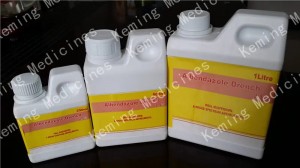Mississippi health officials are imploring residents not to take drugs used in cattle and horses as a substitute for getting a COVID-19 vaccine.
A surge in poison control calls in a state with the nation’s second-lowest coronavirus vaccination rate prompted the Mississippi Department of Health to issue an alert Friday about the ingestion of the drug ivermectin.
Initially, the department said at least 70 percent of recent calls to state poison control centers were related to taking a drug used to treat parasites in cattle and horses.But it later clarified that calls related to ivermectin actually accounted for 2 percent of the state poison control center’s total calls, and 70 percent of those calls were related to people taking animal formula.

According to an alert written by Dr. Paul Byers, the state’s top epidemiologist, ingesting the drug can cause rashes, nausea, vomiting, abdominal pain, neurological problems and severe hepatitis that may require hospitalization.
According to the Mississippi Free Press, Byers said 85 percent of people who called after ivermectin use had mild symptoms, but at least one was hospitalized with ivermectin poisoning.
Ivermectin is sometimes prescribed to people to treat head lice or skin conditions, but it is formulated differently for humans and animals.
”Animal drugs are highly concentrated in large animals and may be highly toxic to humans,” Byers wrote in the alert.
Given that cattle and horses can easily weigh more than 1,000 pounds and sometimes more than a ton, the amount of ivermectin used in livestock is not suitable for people who weigh a fraction of that.
The FDA also got involved, writing in a tweet this weekend, “You’re not a horse. You’re not a cow. Seriously, you guys. Stop.”

The tweet contains a link to information about ivermectin’s approved uses and why it should not be used for COVID-19 prevention or treatment.The FDA also warned of differences in ivermectin formulated for animals and humans, noting that inactive ingredients in formulations for animals could cause problems in humans.
”Many inactive ingredients found in animal products have not been evaluated for use in humans,” the agency’s statement said. “Or they are present in much greater amounts than people use. In some cases, we are not aware of these inactive ingredients. How the ingredients will affect how ivermectin is absorbed in the body.”
Ivermectin has not been approved by the FDA to prevent or treat COVID-19, but these vaccines have been shown to significantly reduce the risk of serious illness or death.On Monday, Pfizer’s COVID-19 vaccine became the first to receive full FDA approval.
”While this and other vaccines meet the FDA’s stringent, scientific criteria for emergency use authorization, as the first COVID-19 vaccine approved by the FDA, the public can have great confidence that this vaccine meets safety, efficacy and Manufactured to the high standards FDA has quality requirements for approved products,” Acting FDA Commissioner Janet Woodcock said in a statement.
Moderna and Johnson & Johnson’s vaccines are still available under emergency use authorizations.The FDA is also reviewing Moderna’s request for full approval, with a decision expected soon.
Public health officials hope that full approval will boost confidence in people who have so far been hesitant to get the vaccine, something Woodcock acknowledged on Monday.
”While millions of people have been safely vaccinated against COVID-19, we recognize that, for some, FDA approval of a vaccine may now instill more confidence in getting vaccinated,” Woodcock said.
In a Zoom call last week, Mississippi health officer Dr. Thomas Dobbs urged people to work with their personal doctor to get vaccinated and learn the facts about ivermectin.

”It’s medication. You don’t get chemotherapy in a feed store,” Dobbs said.”I mean, you wouldn’t want to use your animal’s medicine to treat your pneumonia. It’s dangerous to take the wrong dose of medicine, especially for horses or cattle. So we understand the environment we live in. But , which is very important if people have medical needs going through your doctor or provider.”
The misinformation surrounding ivermectin is similar to the early days of the pandemic, when many believed, without evidence, that taking hydroxychloroquine could help prevent COVID-19.Later studies concluded that there was no evidence that hydroxychloroquine helped prevent the disease.
”There’s a lot of misinformation around, and you’ve probably heard that it’s OK to take high doses of ivermectin. That’s wrong,” according to an FDA post.
The increase in ivermectin use comes at a time when the delta variant has led to a surge in cases across the country, including in Mississippi, where only 36.8% of the population is fully vaccinated.The only state with a lower vaccination rate was neighboring Alabama, where 36.3% of the population was fully vaccinated.
On Sunday, the state reported more than 7,200 new cases and 56 new deaths.The latest surge in COVID-19 cases led the University of Mississippi Medical Center to open a field hospital in a parking lot this month.
Post time: Jun-06-2022




